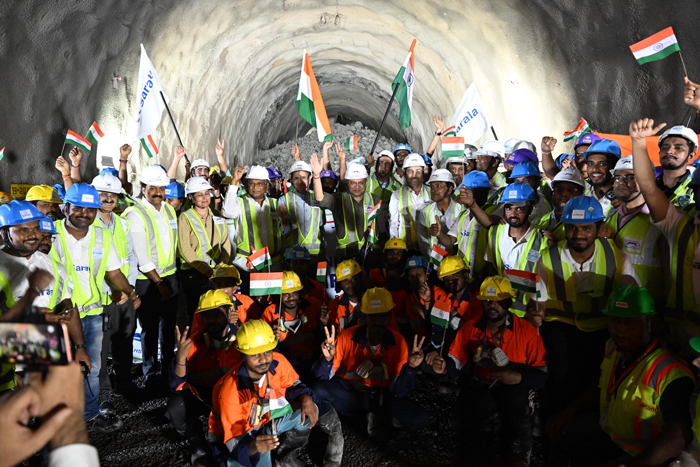The Railways Minister also assured that fares on India’s first bullet train corridor between Ahmedabad and Mumbai would remain affordable, with a structure designed to be reasonable and accessible to the middle class.
Union Minister for Railways Ashwini Vaishnaw has confirmed that execution-related delays during the Uddhav Thackeray-led government in Maharashtra pushed back the Ahmedabad-Mumbai bullet train project by 30 months and led to cost escalations.
Speaking to the media after engineers achieved a breakthrough in the construction of a 4.8 km tunnel section between Ghansoli and Shilphata at Thane Creek on Saturday, Vaishnaw said, “The slowdown in the project has delayed the project by nearly two-and-a-half years. The sooner an [infrastructure] project is completed, the earlier its benefits reach the people.”
India’s first bullet train project was launched by Prime Minister Narendra Modi and the late Japanese Prime Minister Shinzo Abe on 14 September 2017. It was originally scheduled for completion by August 2022. However, the collapse of the BJP-Shiv Sena coalition following differences over chief minister selection led to the formation of a new government with the support of the Indian National Congress and Shiv Sena at the onset of the COVID-19 pandemic.
Land acquisition delays and other project-related differences in the Maharashtra section were eventually resolved after a breakaway faction of the Shiv Sena formed a new government with the BJP in June 2022. The corridor runs through the two states of Gujarat (348 km), Maharashtra (156 km), and the union territory of Dadra & Nagar Haveli (4 km).
On being asked about the rise in cost from the originally budgeted ₹1.08 trillion, Vaishnaw said, “We are working on the cost escalation with the Japanese side.”
The Japan International Cooperation Agency (JICA) had initially agreed to a loan of ₹880 billion for the project at a nominal interest rate of 0.1 per cent.
He expressed confidence that the project would now meet its revised timelines. These include trial runs on the Surat-Bilimora section in Gujarat by December 2027, the Ahmedabad-Thane section by 2028, and the full Ahmedabad-Bandra Kurla Complex stretch by 2029.
Middle Class Friendly Fares
Vaishnaw also assured that the fare structure would be affordable. “The bullet train’s fare structure will be middle-class friendly and reasonable. According to Google Maps, it currently takes around nine hours to reach Mumbai from Ahmedabad. The bullet train will cover the same distance in two hours, and that’s a big change.”
Vaishnaw congratulated engineering teams for successfully opening the first 4.8 km of the total 21 km undersea tunnel. “This is a landmark moment as we construct India’s first undersea tunnel, connecting Mumbai and Thane through this challenging creek.”
The Ahmedabad-Mumbai bullet train corridor will integrate Anand, Ahmedabad, Vadodara, Surat, Vapi, and Mumbai into a single economic zone, unifying markets and accelerating industrial growth. Japan has agreed to deploy its next-generation E10 Shinkansen system for the corridor.
Trains will run every 30 minutes in the first phase of operations, reducing to 20 minutes as the system stabilises. With traffic growth, frequency will be increased to one train every 10 minutes.
Manish Pant


